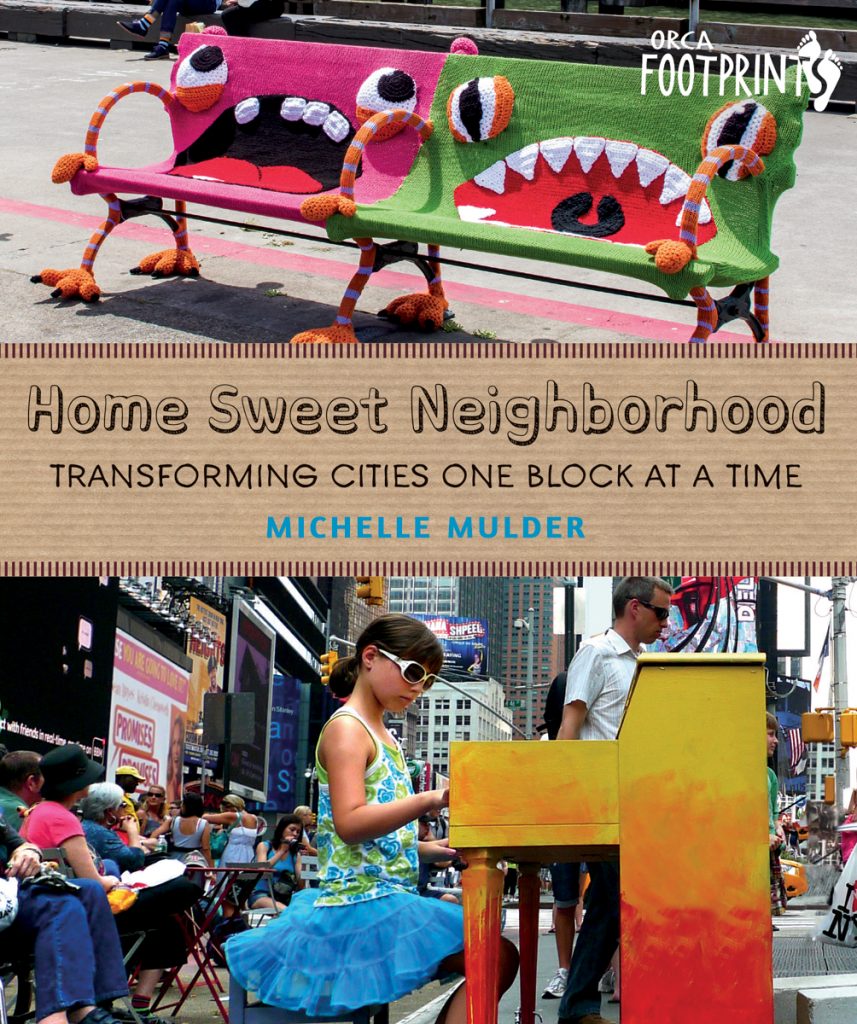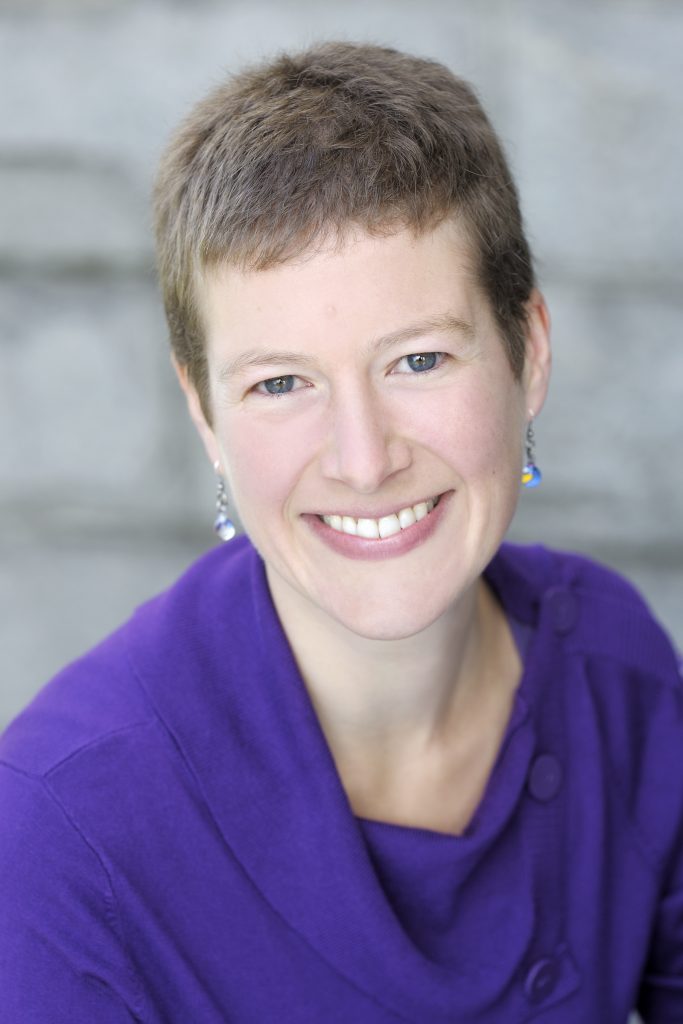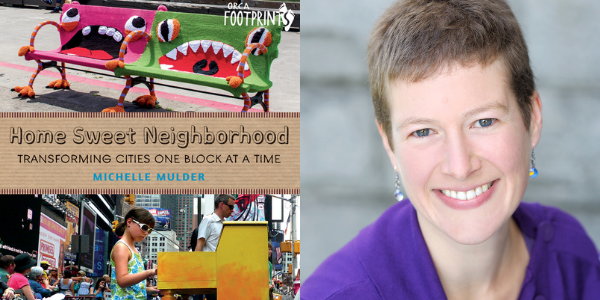
Michelle Mulder is the author of several books in the Orca Footprints series, including Home Sweet Neighborhood: Changing the World One Block at a Time.
Since people started taking COVID-19 precautions such as distancing, she’s noticed a surging interest in topics she loves to write about, like cycling, community-building and gardening. In this Q&A, she talked to us about the importance of community and placemaking, and what people can do to continue to make their communities stronger right now.
You can also listen to her Amazing Places podcast interview about Home Sweet Neighborhood here.
* * *
Beyond hand-washing and mask-wearing, what new social trends have you noticed in your community?
MM: I love seeing more people riding bikes, gardening and going for walks around the neighborhood. As a society, we’ve had to slow down, and though it’s been hard, it’s also encouraged us to spot opportunities that we might have passed over before.
We’re finding joy in simple activities close to home…so much so that bike shops are running out of bikes, garden suppliers are sold out of veggie seeds, and every family I know now makes sourdough bread! This difficult time is fostering some very healthy, soul-nourishing trends.
How can people help build a better and stronger community?
MM: Being present is key. In normal, pre-pandemic life, many of us spent most of our time outside our neighborhoods. We simply weren’t around for spontaneous conversations with neighbors, but simple activities like an evening stroll or smiling at passersby can grow relationships. These connections, and a willingness to nurture them, are the foundations of a strong community.
Why is community important to you?
MM: Every single day, my neighbors and friends do something quirky, generous or hilarious that brings me joy. For example, last night, someone rang our apartment buzzer, and I opened the door to a ginormous zucchini on our doorstep. Other times, I’ll hear giggles in the building hallway because half a dozen kids are setting up a socially-distanced dance party in the stairwell. Once, I was chatting with a neighbor on the sidewalk, and he offered me a painting of a bicycle for my living room. Being part of this constant flow of generosity and creativity makes daily life both celebratory and exciting. It’s empowering too, because if ever I need anything, I’ve got a long list of people I can call. For me, community is joy, spontaneity, sharing and security, all wrapped up in one.
Your book Home Sweet Neighborhood talks about placemaking and its transformative power in neighborhoods. What is placemaking? What are some of your favorite local examples of it?

MM: Basically, it’s creating spaces that people enjoy being in, so they pause and start building relationships in and around those spaces. Placemaking can mean adding something like a bench, a garden or a book-exchange box to a public space, but it can also be a temporary change. In April, kids in our building created a block-long hopscotch. Our neighbor on the fourth floor said it was amazing to watch people young and old, in overalls or business suits, see the hopscotch, check to see if anyone was watching, take a breath and hop all the way down the sidewalk, giggling. Sometimes placemaking is simply changing the way we perceive a place. During lockdown, families in our building banged pots and pans on our balconies at 7 pm to thank essential workers. It was fun, but lonely, so we decided instead to gather far apart on the front lawn along our busy street. Pedestrians cheered, drivers honked, and neighbors came from blocks around to join in with kitchenware, a trumpet, a harmonica or even a children’s xylophone. Just showing up regularly turned our front lawn into a socially distanced, daily community hub.
In Victoria and in many other communities, there’s been a huge increase in people biking. Your book Pedal It: How Bicycles Are Changing the World says that cycling can help build community too. How does that work?
MM: I think it’s all about pace. Cars get us where we need to go relatively quickly, but we miss a lot along the way. When we cycle, we’re in closer contact with the neighborhood we’re traveling through. We feel the wind on our faces. We’re going slowly enough to notice details like an unusual bird in a tree or a new book-exchange box or a friend we haven’t seen in ages. It’s easier to stop and linger. This slower pace encourages car drivers to slow down too, which can improve street safety for everyone.
In your novel The Vegetable Museum, Chloe learns about gardening and its importance from her grandfather. Are you a gardener? If so, what type of things do you grow and why?
MM: I love growing plants that won’t get immediately chomped by local deer! In our boulevard garden, I grow lavender, rhubarb, bay leaves, potatoes, mint, lemon balm, garlic and lemon verbena, as well as a wildflower mix for the bees. In our parking spot garden boxes, I’ve put up netting, so I’ve got strawberries, purple spinach and a variety of flowering plants that neighbors have gifted us over the years. I like getting my hands in the dirt at a friend’s urban farm too. It’s relaxing to do something so sensory, and I love watching an abundance of food growing right here in the city.
What do you think makes a strong community?
MM: Being present. Noticing opportunities for friendliness and generosity. Respect. Making time to have fun together in simple ways. Sharing resources, whether it’s the proverbial cup of sugar, too much zucchini or tips on how to make your own hand sanitizer. Life is so much richer when we’re surrounded by a diverse community of caring people!

Michelle Mulder is the founding author of and has written six other titles in the Orca Footprints series—Pedal It!, Brilliant!, Every Last Drop, Trash Talk, Pocket Change and Going Wild. Michelle has also written the novels The Vegetable Museum, Not a Chance, Out of the Box, After Peaches and several other books for young people. She lives in Victoria, British Columbia. For more information, visit michellemulder.com.


